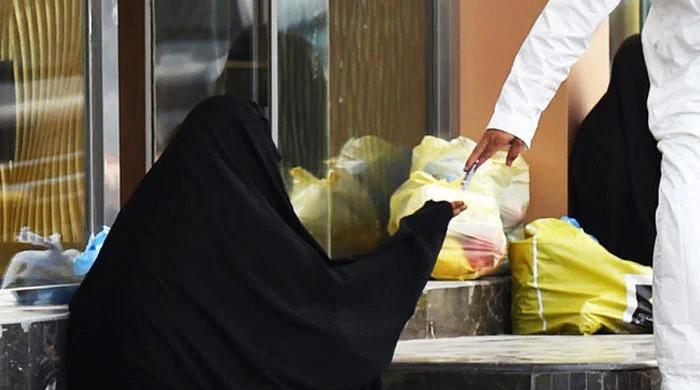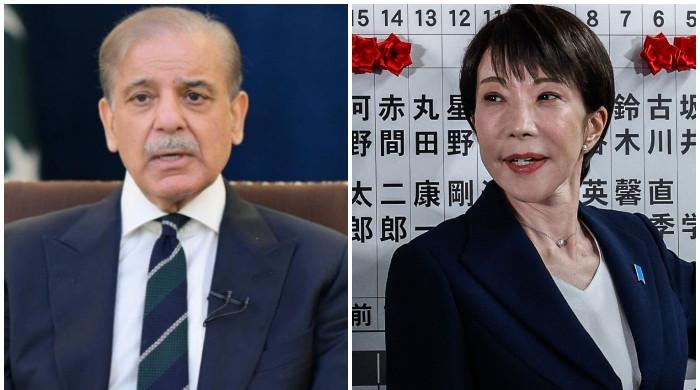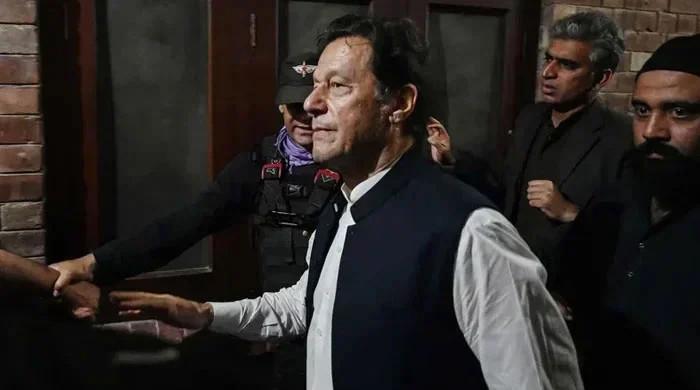Pakistan's economy contracted 0.38% in FY2020 as coronavirus wreaked havoc: Economic Survey
Finance adviser Abdul Hafeez Shaikh unveils the Pakistan Economic Survey 2019-20, revealing large shocks to the national economy
June 11, 2020
ISLAMABAD: Advisor to the Prime Minister on Finance Abdul Hafeez Shaikh presented the Pakistan Economic Survey 2019-20 on Thursday, highlighting the state of the Pakistani economy in the outgoing fiscal year.
Shaikh highlighted the fragile condition of the economy, which was ravaged considerably by the COVID-19 pandemic in the last quarter of the year.
He revealed that the GDP is expected to contract 0.38% in FY 2020 despite 2.67% growth in the agricultural sector, as the industrial and services sectors see growth of -2.64% and -0.59% respectively this year.
Talking about measures taken by the government to arrest ballooning internal and external imbalances, Shaikh praised Prime Minister Imran Khan and army chief Gen Qamar Javed Bajwa for their role in managing expenditures. Noting that the state had cut down its expenditures, he highlighted that at the same time, public spending had been increased.
Shaikh highlighted that the government did not taken any loans from the State Bank of Pakistan the entire year and did not give any supplementary grant to any department as it wanted to ensure the public's money was spent carefully.
The advisor credited the successful policies of the government for an improvement in key indicators, taking note of "a stable exchange rate, healthy growth in FDI (126.8%), improved ranking in World Bank’s ease of doing business index, and ‘Stable’’ credit outlook to B3 from ‘Negative’ by Moodys".
The prime minister's advisor said that the government had returned loans worth Rs5,000bn over the course of the year. He said that Pakistan's revenue had declined due to a decline in its exports, and that the government had doubled the money for the coronavirus fund despite the economy suffering from setbacks due to the pandemic.
Speaking about the coronavirus pandemic, Shaikh said that it was not possible to ascertain when the pandemic would end. He said that the government had tried to maintain a balance between saving people's lives and at the other end, protecting the economy as well.
Unprecedented shocks
The report made note of several developments in the global economy in FY 2020 which reverberated around the world. It noted that protests in Hong Kong triggered the worst crisis in Asia’s biggest financial center. Likewise, Indian attempts at annexation of Kashmir led to suspension of trade between Islamabad and New Delhi, while the UK’s exit from the EU changed the European market irrevocably. Meanwhile, the US-China trade war continued to cast a pall on the global economy, while global oil prices slumped. As global players navigated these challenges, the novel coronavirus engulfed the entire world, disrupting supply chains and bringing economic activity to a standstill.
The report’s authors noted that the COVID-19 pandemic has essentially wiped out any economic performance of any economy due to the financial and health crises it sparked, not to mention the resultant collapse of commodity prices.
“The economic impact of COVID-19 depends on the pathway of the pandemic, the effectiveness of containment measures, the magnitude of supply disruptions, the impact of tightening in global financial market conditions, changes in spending patterns, behavioral changes and unstable commodity prices,” the authors of the report write.
They note that the global economy is expected to contract 3% this year, while GDP losses rise to around $9 trillion. More optimistically, they noted that the global growth will rebound to 5.8% in 2021, depending on how successfully the pandemic is contained.
Fruits of govt's economic policies denied
Shaikh spoke about the government's measures related to the current account deficit, recalling that steps had been taken to reduce the deficit by 30% to $13.4bn in FY19.
He disclosed that the pre-COVID-19 current account deficit (July-March, FY20) had reduced further by 73% to $2.8bn (1.1% of GDP) against $10.3 bn (3.7% of GDP) in the same period the previous year.
Blaming the "changed situation" on the coronavirus pandemic, Shaikh said that FBR's tax collection had declined after showing 17% growth.
"We were confident to reach the Rs4.8 trillion collection target but the situation changed due to the coronavirus. Still, we expect that when things change and people are better off, they will pay their taxes," he said.
“As the new fiscal year FY2020 began, the economy started to witness a remarkable turnaround which confirmed that the Government has taken appropriate policy actions to address the macroeconomic imbalances,” the report stated.
“The stabilization efforts paid off in terms of sustained adjustment in current account deficit and continued fiscal prudence. For the first time in many years, the current account deficit posted a surplus in October, FY2019.
“While primary balance continued to remain in surplus during the current fiscal year. During July-March, FY2020, fiscal deficit has been reduced to 4.0% of GDP, while current account deficit reduced by 71% during July-April, FY2020.
“In addition, stable exchange rate, healthy growth in FDI (126.8%), improved ranking in World Bank’s ease of doing business index, and ‘Stable’’ credit outlook to B3 from ‘Negative’ by Moody’s, reaffirmed the successful policies of Government in stabilizing the economy and laying a foundation for robust growth,” it stated.
Managing the downside of new policies
However, the government's stabilization measures also triggered an economic slowdown, a sharp increase in inflation, a slump in job opportunities and the trickle down effect of all these on the most vulnerable citizens.
“To control the price hike, the government made efforts through ensuring smooth supply of commodities, checking hoarding, smuggling and undue profiteering,” the report said.
“In addition, to check inflationary impact, borrowing from SBP has been discontinued and restriction has been imposed on supplementary grants to control aggregate demand and ease out inflationary pressures.”
“To cushion the impact of needed stabilisation policies on the poor, targeted poverty reduction interventions have been made through Ehsaas program, BISP, Sehat Sahulat programme and expanding coverage of Waseela-e-Taleem programme, etc,” it said.
Impact of COVID-19
Pakistan suffered significantly due to the COVID-19 outbreak through a decline in domestic and global demand, suspension of tourism and business travel and the disruption of trade and production linkages and supply lines.
Due to these shocks, “the provisional GDP growth rate for FY2020 is estimated at negative 0.38% on the basis of 2.67%, -2.64% and -0.59% percent growth in agricultural, industrial and services sectors respectively.”
“To invigorate growth, the government announced a Rs1.24 trillion relief package. The SBP has also taken various steps, including reduction in interest rate to 8%, refinancing schemes for medical centers and various incentives for export-oriented industries etc.
“There has been considerable support from the international lenders. The IMF has given a one-year relief to Pakistan amid the pandemic and $1.386 billion were given under the Rapid Financing Instrument to address the economic impact of the COVID-19. Aid packages from the Asian Development Bank and the World Bank, along with inclusion by G-20 in their debt relief program, will enable the economy to greatly make up for the projected loss,” the authors wrote.
“As the economy slowly reopens, it is expected that the adverse impact of COVID-19 will be bottoming out. However, the framework for recovery will depend on various factors like extent of adverse impact on various sectors, duration as well as severity of lockdowns and the associated risks.
"The outlook therefore carries challenges due to uncertainties associated with it. However, fiscal stimulus package […] along with measures taken by State Bank of Pakistan for providing liquidity support to households and businesses will counteract the current economic downturn and provide much needed relief to the population in need,” it concluded.











